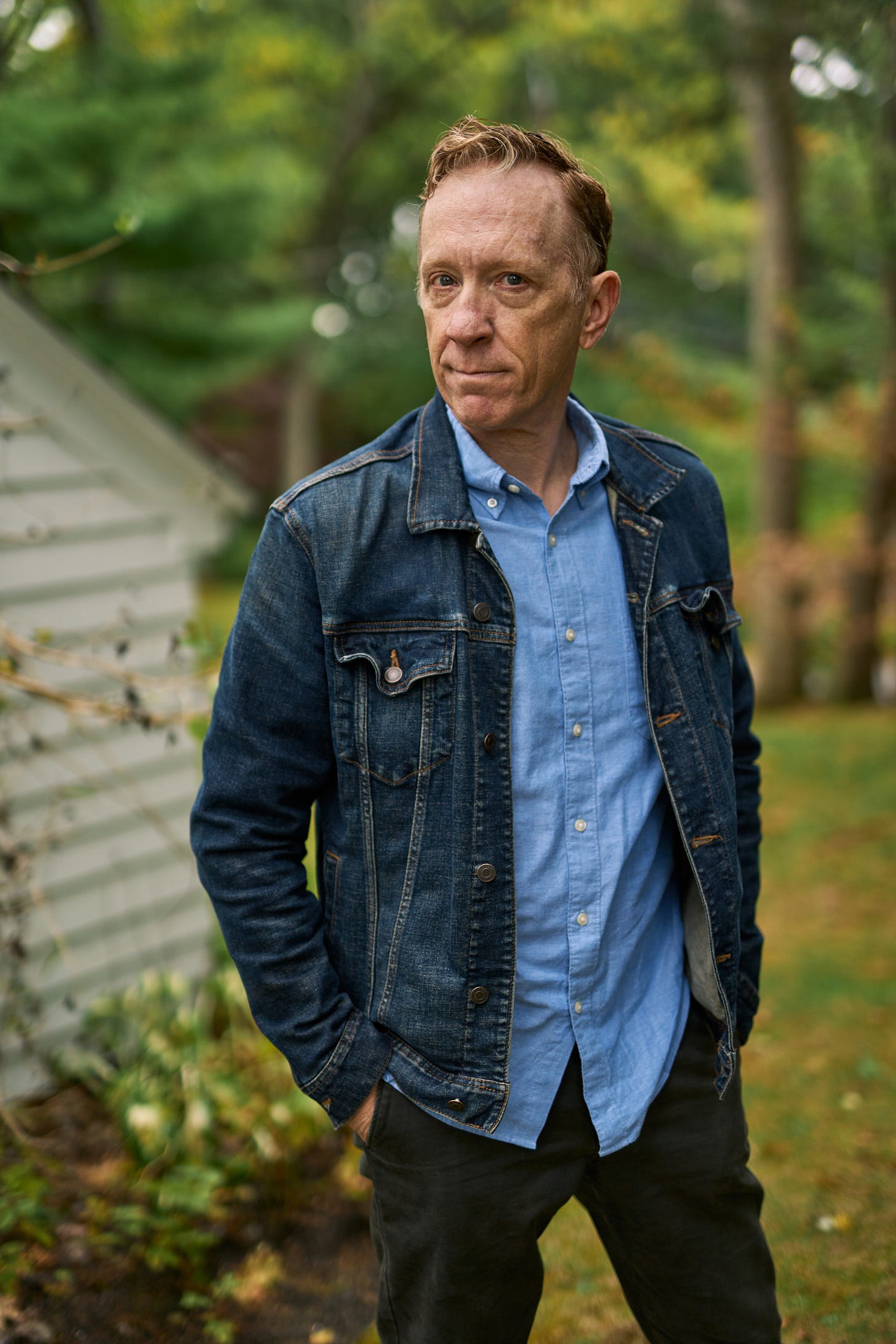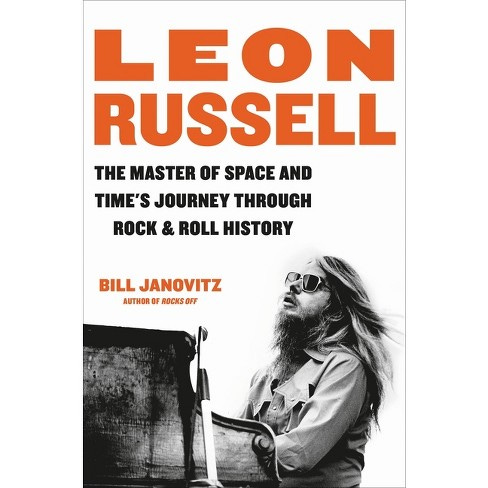Masters of Space And Time. An Authors' Chat with Bill Janovitz
A conversation with Bill Janovitz. Leon Russell biographer and Buffalo Tom guitarist. We'll be talking in public Friday, October 27 in Pembroke, MA.
I am really excited that author and musician Bill Janovitz will be in stage in conversation with me this Friday, October 27 at Soundcheck Studios in Pembroke, MA as part f the special Brothers and Sisters show with Friends of the Brothers. His book Leon Russell: The Master of Space and Time's Journey Through Rock & Roll History is one of my favorite rock biographies in recent years, and like my recent works, it was. New York Times best seller. It’s not easy to get one of these books on that list, so three cheers for us!
Bill is also a musician - founder and leader singer/guitarist of the great Buffalo Tom - and he will be sitting in with the band, along with Pat McGee, another local legend whose work int he pat McGee Band I’ve long admired. Very exciting to have these two with us. Both are longtime online friends whom I’ve never met in person. A very special show in store, Rhode Island and Boston-area friends. Tickets here!
This event gave me the excuse to interview Bill about Leon Russell: The Master of Space and Time's Journey Through Rock & Roll History and compare notes. Enjoy!
Bill, we are both rock biographers and musicians. I have always been a writer and worked at Guitar World magazine for years, while playing guitar on the side. I’ve gotten more serious about it and played with bigger and better bands and venues, but my self-perception has not changed in that regard: I am a writer who plays guitar. Where do you fall on that spectrum?
My identity has hopelessly been inseparable from being a musician since my band hit the road seriously in 1988, until 1999-2000 when my daughter arrived. The music biz changed drastically around the same time, and I went into a tailspin. I began freelance writing as something I always wanted to do and now could do as a stay-at-home dad. But I still thought I could/should make a living as a musician. Once I had a "come to Jesus" moment and realized my identity should not be wrapped up in how I made a living but that I would always be a songwriter, singer, and band member, life improved. It was a real existential year or three, essentially an identity crisis. I have the benefit of being in a band that laid a real solid foundation all those years, so we can still, say, sell out good-sized venues in NY, Boston, Chicago, etc. -- even (or especially) Europe. It is all gravy now.
That’s good to hear! I think you started as a writer for the Boston Phoenix and AllMusic and your first book was 33 ½ about Exile On Main Street and then Rocks Off. Did you always have the ambition to do this type of work or was it step by step?
As I mentioned, writing with passion about the music I love (not so much being a critic who was assigned things) was something I always saw myself doing. I still don't do it full-time. So yeah, step by step.
Leon Russell: Master of Space and Time is a great work – congrats. I know as well as anyone what goes into such a work. Several questions about it-How did you first get going on this? Was the family seeking someone to write it? Did you know before you started that you would have access to everyone, to his papers, etc?
Flowing out of the last question and response, I have the luxury (afforded by a day job) to do the projects I want, be they music or writing. After my first Stones book an 2005, I never intended on doing another one focused on the same band, but an agent approached me years later to write another based on 50 songs for 50th anniversary of the band in 2013. It was his idea. That was Rocks Off. In response to that book, my current agent, another person, read it and loved it, and we just connected on that level. The previous agent, who only brokered that 2013 book, was in the UK and we never (to this day) met. It was a one-off.
I felt an instant connection to the new guy, based in NY. He and I tossed around ideas for another five or six years(!) One of my ideas was to focus a book on the Mad Dogs and Englishmen tour, album, and film. He was always supportive but blunt in his assessment that it might be too narrow a focus and appeal commercially. As I am not a ghostwriter or otherwise hustling to string together a living as a full-time writer, I listened to his wise counsel and went back to casting for inspiration. About a year after the Mad Dogs idea, he wrote me an email that read, "You passed on Leon Russell, right?" I said I did NOT pass on Leon, and in fact, had pitched the idea of Leon in the Mad Dogs concept. He said the estate is looking for someone to write a bio with their cooperation. So I got on the phone with the reps and wrote a letter to his widow, pitching myself. They bought the idea, and off we went.
I did not get much in the way of documents and records from the estate. But Jan (his widow) granted me a good number of interviews, and the reps facilitated some connections. This was mostly a blessing, but there was the "curse" element as well; some people did not want to talk to me, knowing this was sanctioned by the family. As you probably know better than I, "official," "authorized," "sanctioned," "commissioned," and so on have different meanings and pluses and minuses. As an author, you want cooperation and access but not the right for anyone else to have editorial sway. I did not send anyone the book until it was finished.
Right. For the record - mostly for the readers - no one approved my books either. My allman Brothers book were written with the band’s cooperation but were not authorized, which means the subject has final say. almost no one understands this, so thanks for an opportunity to state!
Both of our books were boosted by pretty incredible sources – for me, never-before-heard interviews with all ABB members and many others conducted by Kirk West and for you, an unfinished, unpublished memoir by Leon. When did you learn of this? How essential was it in the writing, beyond what we see quoted? Did it, for example, impact your questioning of others, your research, etc?
His memoir was indeed published, albeit self-published, by Jan via a Leon Lifer (superfan). It is there on Amazon for anyone to read. Almost everything in there is a version of some story or other that he told to interviewers. It is rather scant. My good fortune was to have 138+ people, most of whom knew Leon, some of them intimately, willing to talk, some huge music legends among them. Leon meant so much to so many. And many were home sitting on their hands during the pandemic and willing to get on Zoom or the phone.
It’s always a struggle for me to balance personal foibles – drug and alcohol abuse, busted marriages etc – and musical content. I lean towards the latter and cover the former when I feel they really impact the overall story and the art. It feels to me like you struck a similar balance. Did you wrestle with similar issues?
Precisely. Who was this guy, and what made him tick, specifically it came to the music? There was a lot more family drama that was strictly personal and was left out of this particular telling. Anything beyond what I wrote would be up for the principals to write their own accounts.
It still blows my mind that the guy who wrote “This Masquerade” and “superstar” plus all the rest ended up with such money troubles. I think you did a good job detailing the bad business dealings and blind spots without bogging down. This is another area that I always question myself on – how deep to go. For you as well?
I went deep into this. As I mentioned, I did not get access to such records from the family, but Leon had Steve and Charlene Ripley come in trucks to save a huge warehouse of stuff -- tapes, 40-track tape machines, and what Leon called "residue from the fast lane." Whether or not he intended to do so, included was a bunch of documentation. The Ripleys put this all in the stewardship (with Leon's approval) of the Oklahoma Historical Society and the OKPOP museum. THIS was the big access I had to really important stuff to explain not only the financial stuff but helped fill in a lot of the story. Had I known how much OKPOP had, I would have planned for more than a few days in Tulsa. But I spent a stupid amount of time trying to understand where he owned houses, at what points in time, and so on. It was one of those "Ok, lets get this chapter down to a paragraph" moments.
Brothers and Sisters: the Allman Brothers Band and The Album That Defined The 70s, was my third straight instant New York Times bestseller, following Texas Flood: The Inside Story of Stevie Ray Vaughan and One Way Out: The Inside History of the Allman Brothers Band. My first book was Big in China: My Unlikely Adventures Raising a Family, Playing the Blues and Becoming a Star in Beijing, about my experiences raising a family in Beijing and touring China with a popular original blues band. It was optioned for a movie by Ivan Reitman’s Montecito Productions. I am also a guitarist and singer who fronts two bands, Big in China and Friends of the Brothers, the premier celebration of the Allman Brothers Band. We may well be playing near you soon. Click here to find out.








